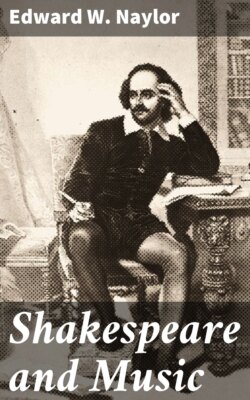Читать книгу Shakespeare and Music - Edward W. Naylor - Страница 5
На сайте Литреса книга снята с продажи.
INTRODUCTORY
ОглавлениеTable of Contents
A principal character of the works of a very great author is, that in them each man can find that for which he seeks, and in a form which includes his own view.
With Shakespeare, as one of the greatest of the great, this is pre-eminently the case. One reader looks for simply dramatic interest, another for natural philosophy, and a third for morals, and each is more than satisfied with the treatment of his own special subject.
It is scarcely a matter of surprise, therefore, that the musical student should look in Shakespeare for music, and find it treated of from several points of view, completely and accurately.
This is the more satisfactory, as no subject in literature has been treated with greater scorn for accuracy, or general lack of real interest, than this of music.
This statement will admit of comparatively few exceptions, one of which must here be mentioned.
The author of "John Inglesant," Mr. Shorthouse, whether he "crammed" his music or not, has in that book given a lively and quite accurate picture of the art as practised about Charles I.'s time.
There is no need here to name the many well-known writers who have spoken of music with a lofty disregard for facts and parade of ignorance which, displayed in any other matter, would have brought on them the just contempt of any reviewer.
The student of music in Shakespeare is bound to view the subject in two different ways, the first purely historical, the second (so to speak) psychological.
As for the first, the most superficial comparison of the plays alone, with the records of the practice and social position of the musical art in Elizabethan times, shews that Shakespeare is in every way a trustworthy guide in these matters; while, as for the second view, there are many most interesting passages which treat of music from the emotional standpoint, and which clearly shew his thorough personal appreciation of its higher and more spiritual qualities.
Hamlet tells us, and we believe, often without clearly understanding, that players are the abstracts and brief chronicles of the time, and that the end of playing, both at the first and now, was, and is, to hold the mirror up to nature, and to shew the very age and body of the time, his form and pressure.
The study of this one feature of the "age and body" of Shakespeare's time, with the view of clearly grasping the extreme accuracy of the "abstract and brief chronicle" to be found in his works, will surely go some way to give definiteness and force to our ideas of Shakespeare's magnificent grip of all other phases of thought and of action.
The argument recommends itself—"If he is trustworthy in this subject, he is trustworthy in all."
To a professional reader at all events, it argues very much indeed in a writer's favour, that the "layman" has managed to write the simplest sentence about a specialty, without some more or less serious blunder.
Finally, no Shakespeare student will deny that some general help is necessary, when Schmidt's admirable Lexicon commits itself to such a misleading statement as that a virginal is a kind of small pianoforte, and when a very distinguished Shakespeare scholar has allowed a definition of a viol as a six-stringed guitar to appear in print under his name.
Out of thirty-seven plays of Shakespeare, there are no less than thirty-two which contain interesting references to music and musical matters in the text itself. There are also over three hundred stage directions which are musical in their nature, and these occur in thirty-six out of thirty-seven plays.
The musical references in the text are most commonly found in the comedies, and are generally the occasion or instrument of word-quibbling and witticisms; while the musical stage directions belong chiefly to the tragedies, and are mostly of a military nature.
As it is indispensable that the student of Shakespeare and Music should have a clear idea of the social status and influence of music in Shakespearian times, here follows a short sketch of the history of this subject, which the reader is requested to peruse with the deliberate object of finding every detail confirmed in Shakespeare's works.
